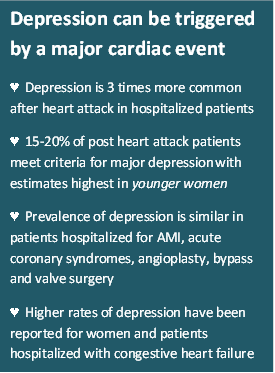Depression Revisited
En español
 I
have written before about how depression, if left untreated, can have a
negative effect on heart health, especially for women (Depression Hard on Hearts).
I
have written before about how depression, if left untreated, can have a
negative effect on heart health, especially for women (Depression Hard on Hearts).
Studies
have shown a strong link between depression and increased risk of
cardiovascular disease and for those who have had a heart attack, added risk
for a second attack.
In fact, eight studies — including 15,613 patients
followed for 153,031 patient-years — have robustly shown that depression increases
the risk of a first cardiac event in
patients without any prior history of heart and vascular disease.
What is depression like for heart attack survivors?
 For those
recovering from a heart attack, depression can be among a mix of strong
feelings about what has happened to you.
For those
recovering from a heart attack, depression can be among a mix of strong
feelings about what has happened to you.
Denial, anger, fear, anxiety, and depression are
common emotions among heart attack survivors. These are normal reactions, and you should
talk about these feelings with your doctor.
Feelings
of depression may last for several months. Common signs of depression include
- sleep problems
- not feeling hungry
- feeling very tired
- not caring about things
that used to be important to you
- having a low self-esteem
Some patients may need professional help and
medicine for depression.
It is very likely
that your family, friends, and coworkers will be affected by your heart attack
as well. They will have concerns about your future and questions about your
condition. Lifestyle changes, even something as simple as a new diet, may
cause stress within your family.
Depression can and should be treated
Treatment of depression includes pharmacologic therapy (medicines) and behavioral therapy.
A positive
attitude toward recovery and treatment can help a lot as you struggle to deal
with your feelings. Your physical recovery is not the only recovery that can
begin in the hospital. Emotional and mental recovery can begin there as well.
When you are ready, your doctor can talk to you about what has happened, why it
has happened, and what your treatment options are. Understanding and accepting
your condition are the first steps toward a good mental outlook. Supportive
friends and family are also very important.
The
negative feelings you have after a heart attack usually will pass as you
recover and slowly return to your normal activities.
You can also
get into a support group and/or a cardiac rehabilitation program to get added
counseling and emotional support as you come to grips with your post-heart attack
feelings.
Are you at risk?
A simple 2-question assessment, the
Patient
Health Questionnaire-2 (PHQ-2) has been validated to identify currently
depressed patients and is endorsed as a screening tool in cardiac patients by the American Heart
Association (AHA) AND the American Psychiatric Association, as well as others.
Choose one answer for each question from the PHQ-2:1. Little interest or pleasure in doing things?
a. Not at all
b. Several days
c. More than half the days
d. Nearly every day
2. Feeling down, depressed, or hopeless?
a. Not at all
b. Several days
c. More than half the days
d. Nearly every day
Now, score your answers by adding up the points:
a=0; b=1; c=2; d=3. |
If you score 3 or more on the PHQ-2, this indicates the need for a 5-minute, 9-question screening test called PHQ-9.
[To see PHQ-9 questions, and learn more detail about Patient Health Questionnaires, read "Identify and Treat
Depression for Reduced Cardiac Risk and Improved Outcomes" Texas Heart Institute Journal. 2012; 39(2): 231–234.]
Get help
As
always, listen to your body. If you think you may be experiencing cardiac problems, don't hesitate, get help quickly.
If you
have already experienced cardiac problems and are having difficulty adjusting
to your new reality, don't go it alone, seek help.
Until next time!

Stephanie Coulter, MD
Do you have a topic that you would like to learn more about from Dr. Stephanie? Send us an email at women@texasheart.org and your question may be the next Straight Talk topic!
We are saving hearts and trees. The Women's Heart Health E-News is sent via e-mail and posted online. Sign up using the form on this page. Read previous issues in archives.
Visit the Center for Women's Heart & Vascular Health at www.texasheart.org/women.

